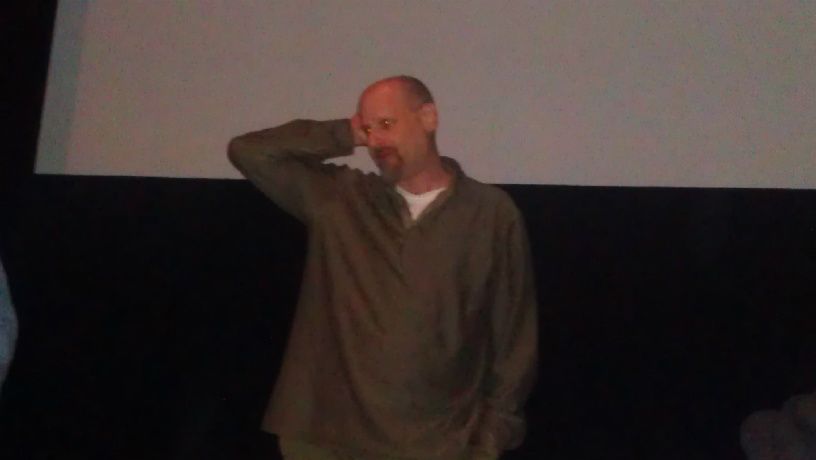
The Golden Age of Science Fiction director Eric Solstein
We were in theater #2 for this one, and I'm not sure why that was the only day we were out of the screening room; on both weeks, the Somerville Theatre was only showing four movies, and only a few days had live shows and special presentations in the big room; Friday, in particular, had two short programs with local filmmakers, with the second one at least over capacity.
The night's feature was pretty good, although there were bits that I would have liked to see expanded upon somewhat. John Campbell's personal life is almost completely left out, and there was some odd stuff there. There was more interesting information on that in the introductions to stories in The Worlds of George O. (Smith, that is); that's where I first heard about Campbell's early interest in dianetics, how authors felt it was sending Astounding off the rails, and how it was a contributing factor to Campbell and his first wife divorcing (and her taking up with Smith). Maybe that sort of soap opera wasn't what Solstein was looking for anyway, but knowing those holes are there makes me wonder why more wasn't done along those lines, or at least acknowledging that there were issues, not just in his personal life, but in how the magazine ran as a result.
I'd put an Amazon link to the book, but it's out of print. Not expected for a paperback from 1982 (and I have no idea what used bookstore I picked it up in and why I went for that one), but I was kind of surprised that the edition of Campbell's The Black Star Passes I bought a year or two ago wasn't available either. For a guy who is as important as Campbell - Analog is in many ways still his magazine, 45 years later - his own work and those of his collaborators are awfully hard to find, unless they've fallen into the public domain and can thus be found on the Kindle.
The Golden Age of Science Fiction
* * * (out of four)
Seen 16 February 2012 in Somerville Theatre #2 (Boston Sci-Fi Film Festival, video)
Though it may seem odd to some that this movie should focus on one man when title references a period of roughly fifteen years when many great authors wrote their classic works, science fiction fans probably won't have too much of an issue with it. Seventy-five years after becoming editor of Astounding, John W. Campbell Jr. is likely still the most important figure in the genre, even if his own personal great works were few.
Campbell, we learn, had a science background but never actually worked in the field, taking other jobs and writing stories (including "Who Goes There?", later adapted as The Thing) before being tapped as the new editor of Astounding in 1937. He worked alongside the previous editor for several months, but in 1938 the first issues under his sole stewardship came out, and his stamp was immediately clear: More emphasis on quality writing while still insisting on a good understanding of science, editorials meant to challenge and stimulate the readership, and a tendency to feed writers ideas and help them shape stories early, rather than make changes later. He would frequently claim to have read more lousy sf than anybody, because he personally went through every submission that came in. He made Astounding the premiere magazine for science fiction, but the properties that made him excellent at his job would cripple him in other areas, and eventually hurt his work.
Director Eric Solstein didn't set out to make a movie about Campbell per se; he started out by interviewing the surviving writers from that era in the late 1990s and early 2000s for a project called "The Possible Future", mainly aimed at academic institutions. "The Editor" was a topic included in many of these conversations, generating enough material without repetition to make up a documentary of its own. Working mainly with this footage, he constructs what is essentially an oral history: Nearly the entire film is his interview footage, and the exceptions don't stray too far from that.
Full review at EFC.
No comments:
Post a Comment